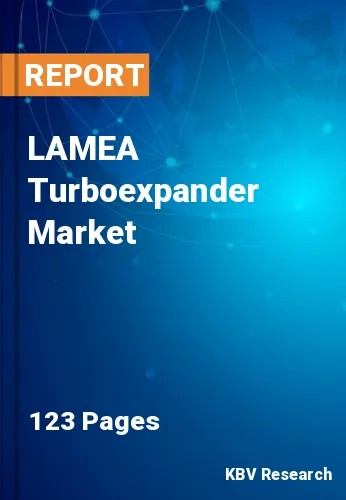The Latin America, Middle East and Africa Turboexpander Market would witness market growth of 7.2% CAGR during the forecast period (2022-2028).
In the early 1960s, the turbo-expander process for processing gas flows for high liquid extraction was invented. These plants use an expansion turbine instead of a compressor or J-T valve to cool the gas to 160 degrees Fahrenheit (107 degrees Celsius). The turbo-primary expander's function is to improve ethane recovery from natural gas. Since the process achieves extremely low temperatures, a significant amount of the heavier ethane chemicals in natural gas are liquefied. Distillation is used to recover the multiple portions of the liquid stream.
The setups of turbo-expander processes can vary substantially. They're all made up of different heat exchangers. Upstream of the plant, the gas approaching the turbo expander procedure must be dried to a very low water content so that no hydrate develops when the gas being processed reaches the low temperatures. This normally necessitates a glycol dehydration unit to remove the majority of the water from the supply gas, followed by a molecular sieve unit to remove practically all of the water. The pore opening of a common type of molecular sieve used for thorough drying is 4 A. CO2 and H2S can be removed as part of the gas pre-treatment process.
The UAE produces 3 million gallons of oil and liquids per day on average and has 100 billion barrels of oil reserves. Approximately 30% of the country's GDP is directly based on oil and gas production, which accounts for nearly 13% of the country's total exports. The oil industry's profits and royalties provide for the vast majority of the UAE government's revenue. The United Arab Emirates is working to develop conventional oil and gas extraction. The UAE stated in 2020 that it had discovered over 80 trillion cubic feet of gas reserves at Jebel Ali. The government aims to be gas self-sufficient by 2030, however it now receives natural gas from Qatar via the Dolphin pipeline. The Hydrogen Alliance was launched in 2021 by Mubadala Investment Company, Abu Dhabi National Oil Company (ADNOC), and ADQ to promote the production of blue and green hydrogen for export.
The Brazil market dominated the LAMEA Turboexpander Market by Country in 2021, and would continue to be a dominant market till 2028; thereby, achieving a market value of $29.1 million by 2028. The Argentina market is poised to grow at a CAGR of 7.7% during (2022 - 2028). Additionally, The UAE market would display a CAGR of 6.9% during (2022 - 2028).
Based on Product, the market is segmented into Radial Flow and Axial Flow. Based on Loading Device, the market is segmented into Compressor, Generator, and Hydraulic/Oil-brake. Based on Application, the market is segmented into Cryogenic, Air Separation, Oil & Gas Processing, and Others. Based on End-use, the market is segmented into Oil & Gas, Energy & Power, Chemical & Petrochemicals, and Others. Based on Power Capacity, the market is segmented into 1MW - 4 MW, 5MW - 9MW, Less than 1 MW, 10MW - 19MW, 20MW - 24 MW, 25 MW - 40 MW, and Others. Based on countries, the market is segmented into Brazil, Argentina, UAE, Saudi Arabia, South Africa, Nigeria, and Rest of LAMEA.
Free Valuable Insights: The Global Turboexpander Market is Predict to reach $1.3 Billion by 2028, at a CAGR of 4.5%
The market research report covers the analysis of key stake holders of the market. Key companies profiled in the report include Honeywell International, Inc., Baker Hughes Company, Siemens AG, Atlas Copco AB, Cryostar, Air Products and Chemicals, Inc., Chart Industries, Inc., MAN Energy Solutions SE, Elliott Group, and R&D Dynamics Corporation.
By Product
By Loading Device
By Application
By End-use
By Power Capacity
By Country
Our team of dedicated experts can provide you with attractive expansion opportunities for your business.

